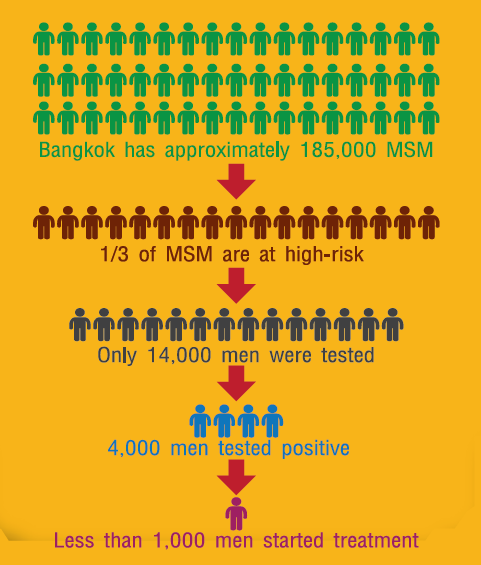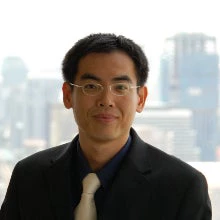
In Asia, Thailand remains one of the countries hardest hit by the HIV epidemic. Currently, 440,000 people are living with HIV and approximately 1,250 people die each year from HIV-related causes.
Although the country is often praised for its highly successful efforts to curb the spread of HIV among sex workers and their clients, particularly through the world-renowned 100% Condom Use Program, its response to HIV among men who have sex with men (MSM) has been limited.
As a result, the prevalence of HIV among MSM has risen sharply from around 6% in the late 1990s to as high as 20-30% currently, and continues to grow. From 2012-2016, it is estimated that 39,000 people will be infected with HIV in Thailand. MSM make up 44% of these new HIV cases, with around one-third of the infections occurring in Bangkok. The proportion of MSM among new HIV cases could go as high as 59% within the next 10 years, according to estimates made by the Asian Epidemic Model.
A key stumbling block to halt the spread of HIV among MSM is that very few MSM in Bangkok get tested and treated despite the fact that HIV testing and treatment are free for all Thai citizens.
With an overall population of 185,000 MSM, an estimated 60,000 MSM are at high-risk of infection. Out of the high-risk group, only 14,000 men were tested, with 4,000 diagnosed positive. Sadly, less than 1,000 men have started treatment.

There are three things that Bangkok can do to address its low levels of HIV testing and treatment.
First, there is a need for the government to invest more in early testing and treatment for high risk groups. Not only will it save lives, it will also cut costs. An additional $55 million investment will increase HIV treatment coverage to 80%. Over 5,000 HIV-related deaths and 3,700 new cases can be prevented each year. It actually only costs $10,000 to save one life from HIV-related death.
Second, there is a need to scale up testing and treatment at public medical facilities, which currently have huge capacity but are left unused. There are more than 90 testing and treatment medical facilities in Bangkok that provide free and confidential HIV testing and treatment services, therefore access is not a problem. These include clinics at private hospitals to government run health centers by the Bangkok Metropolitan Administration. But over 75% of HIV testing and treatment are done in only two locations, at research clinics, with other facilities left relatively unused.
According to our study “Scaling up HIV Treatment for MSM in Bangkok: What Does It Take,” public medical facilities had the lowest unit cost for HIV tests ($15/test) compared to research clinics ($33/test), Bangkok Metropolitan Administration health centers ($34/test) and private hospitals ($40/test). Public medical facilities can test and treat patients effectively and at the lowest cost.
Given the cost-effectiveness and available space, the burden of HIV testing and treatment should be shifted to public medical facilities. They can play a unique and irreplaceable role to scale up treatment among Bangkok’s MSM. They can also be made more effective by drawing on the successful experiences of research clinics that have created welcoming environments for patients with convenient hours and friendly staff.
Third, and perhaps most importantly, there is a need to create and raise more awareness about HIV testing and treatment services for MSM. Health facilities also need to take into account that stigma and discrimination are the greatest barriers preventing the scale-up of services for MSM. MSM are often afraid of being seen by peers and being discriminated against by healthcare workers when receiving HIV tests. Strategic use of social media and multiple recruitment methods will help connect MSM to HIV testing and treatment services. Peer follow-ups have shown to be effective in connecting diagnosed individuals to treatment.
Successfully scaling up HIV testing and treatment can save lives, maintain people’s health and prevent new infections from spreading. Health facilities and MSM communities, especially, can join forces to encourage more testing. With broader cooperation between the government, health facilities and the community, this can slow and even stop Bangkok’s HIV epidemic among high risk groups like MSM. We want to get to zero new infections, zero discrimination and zero AIDS-related deaths.


Join the Conversation